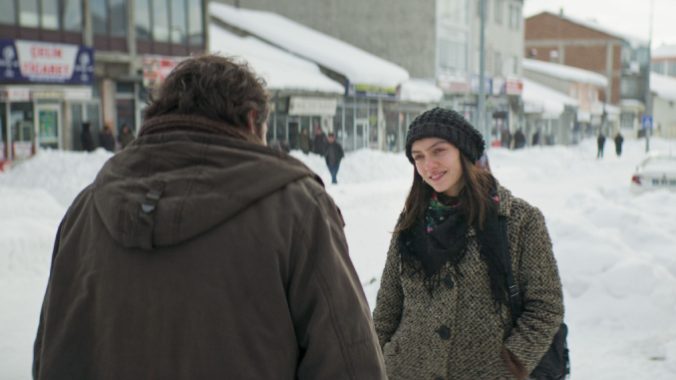About Dry Grasses Is Nuri Bilge Ceylan’s Literary, Feminist Epic

Veteran Turkish director Nuri Bilge Ceylan returns to Anatolia, a place he previously explored in his Palme d’Or winner Winter Sleep, in About Dry Grasses. Although Winter Sleep is both more explicitly interested in exploring class dynamics in rural Turkey and more literary than About Dry Grasses (Winter Sleep is an Anton Chekhov adaptation), these two stories could be taking place side by side.
About Dry Grasses opens with a lone figure making his way through the snow. Samet (Deniz Celiloğlu) is a young art teacher working in Anatolia, but his ultimate goal is to shake the dust of what he sees as a crummy, rural town from his boots and return to the more modern Istanbul. What he plans to do in Istanbul is unclear. He just knows he’s ready to go, without giving much thought to the effect his departure will have on his community. Samet is a big fish in the small pond of Anatolia, a place where he can make a real difference in his students’ lives and in the lives of those around him, if he so chooses. Istanbul is a much larger pond, and especially with no direction, it’s clear that Samet would stall at best, flounder at worst, if he were to make it to Istanbul at all.
Samet’s aimless goal is jeopardized when Sevim (Ece Bağcı), one of his students, accuses Samet, along with his fellow teacher and roommate Kenan (Musab Ekici), of misconduct. Sevim’s accusations come as a real shock to Samet, as he’d considered her a trusted mentee; she’s a real Hermione type, wild mane and all. There’s so much more to Sevim than meets Samet’s eye, if only he’d be curious enough to look.
But Samet is far more preoccupied with puffing himself up, with controlling the given situation around him, which leads to his woefully miscalculating of a number of personal encounters. Samet takes wonderfully alive photographs of the students and villagers around him, but he doesn’t do anything with them. Samet sees when his students are uncomfortable with their privacy being infringed upon when school administrators execute largely performative bag searches, but he doesn’t stand up for the kids.
The second narrative thread of About Dry Grasses also concerns Samet’s inadequacies with women, and almost reads like a Woody Allen subplot. Samet is set up on a date with the quietly magnetic Nuray (Merve Disdar), an English teacher who draws for fun, and they have a lot in common. Instead of seeing where things go, Samet dismisses her outright due to his plan to relocate to Istanbul, choosing instead to introduce her to Kenan. Kenan and Nuray hit it off—she takes his picture, he teaches her how to drive—but when Samet learns of Nuray’s familial connections to Istanbul, he is suddenly interested again, needlessly entangling the three in a love triangle.
-

-

-

-

-

-

-

-

-

-

-

-

-

-

-

-

-

-

-

-

-

-

-

-

-

-

-

-

-

-

-

-

-

-

-

-

-

-

-

-








































